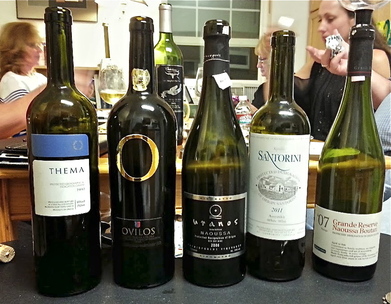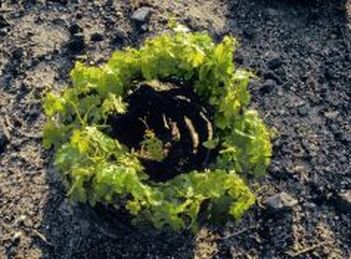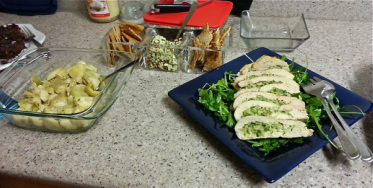|
Disclosure: Wine tasting is a highly individual experience and, scientifically, none of us perceive wine in exactly the same way. The opinions expressed in this post are mine and mine alone and although the wines sampled were supplied by the designated wineries for review I describe them as I see them.  The connection between the grapevine and Greece is almost as old as wine itself. The ancient Greeks spread viticulture throughout the Ancient World and, for them, wine was not just a commodity but life and culture as well. So with this long history in mind, it was with great excitement that I joined with other members of the Temecula Wine Council to sample five wines kindly supplied by the “New Wines of Greece”. For many of us, when we here “Greek wine” we immediately think of ‘Retsina’, perhaps crafted in rustic old wineries from grapes we can’t pronounce! I am glad to report that nothing could be further from the truth. There has been a mammoth revival in the Greek wine industry, beginning in the late 20th century. Many local winemakers, who ventured to wine producing areas throughout the world, have returned to their roots, building shiny new production facilities that rival those of the ‘New World’. While embracing many new winemaking techniques there is desire to blend them with time-honored philosophies such as biodynamic and organic viticulture and the use of indigenous grape varieties. And so, we gathered at the Dorland Mountain Arts Colony, just outside Temecula, CA. The fresh air and solitude made for the perfect venue. Each of the six members attending the tasting were assigned one of the wines and asked to prepare a compatible dish for everyone to share. As you will discover, much of the fare paired well with many of the wines, showing just how food friendly and versatile these vintages turned out to be! First up was “Thema 2012” from Pavlidis Estate near the Macadonian town of Drama in northern Greece. A 50/50 blend of Sauvignon Blanc and Assyrtiko, (ah-SEER-tea-ko) the wine is a prime example of old meets new. The region of Macadonia has been a prime grape growing area for millennia and founder Christoforos Pavlidis has been cultivating both native and international varieties since 1998. The winery embraces modern viticulural practices on its 148 acres planted on a variety of soils in two vineyard sites. The winery itself is state of the art and visitors are welcome in their modern tasting room located on the “Wine Road of Dionysus”. The wine was delightful, with a subtle, elegant nose of lemon cream enchanced with touches of fresh green herbs. The zippy acidity and lime zest flavor accentuated the saltiness of the smoked salmon brought to pair with it. Our second vintage came to us from the home of the famous Greek varietal, Assyrtiko – the Aegean island of Santorini.  courtesy New Wines of Greece.com courtesy New Wines of Greece.com Domaine Sigalas Assyrtiko-Athiri 2011 is another example of traditional grape varietals truly showing their ‘terroir’ through more modern production. Domaine Sigalas was founded in 1991 and by 1998 had constructed a brand new winery/production center near Ola, in the northern part of the island. Their 47 acres of vineyards are planted on volcanic soils comprised of cinders, lava and pumice. They specialize in indigenous grape varieties grown in the traditional manner unique to Santorini. Vines are trained low to the ground, woven around itself like a round basket. This format, called a Kouloura meaning wreath or basket, protects the vines from strong winds and also shields the grape clusters from the intense, direct sunlight. The wine was a prime example of how the local white grapes of Greece have evolved to withstand the heat and sun of the Mediterranean without losing any of their distinctive, refreshing acidity. The clean, citrusy aromas were a true indication of what was found in the glass! Amazing, racy, mouth-watering acidity combined with a slight hint of sea air minerality and touches of lime blossoms. It was a terrific compliment to the steamed artichokes in olive oil, herbs and seasonings; the wine acting like a spritz of brightness, bringing out the flavor of the vegetable and freshness of the herbs. The last white of the evening also hailed from Macadonia - Ovilos Estate Biblia Chora 2010 a blend of a traditional native grape (50% Assyrtiko) and an international variety (50% Semillon). Vineyards here were first planted by the Phoenicians who found this “Golden Mountain” while in search of precious metals. Alexander the Great mined gold here to finance his expeditions and the Cult of Dionysus (or Bacchaus to the Romans) made their wines from Macadonian fruit. But enough history! The winery’s founders both studied in Bordeaux and returned to their homeland to make wine. The original 70 acres were planted in 1998 and now there are close to 350, all of which are farmed organically. A modern winery, built to resemble a grand Bordelais Chateau, was built in 2001 and their efforts have paid off; the wines have won numerous awards throughout the world.  This blend had a beautiful brilliant gold appearance, reflecting the 8 months the wine spent in oak. The aromas were clean and fresh with notes of golden apple, soft fruit blossom florals and a suggestion of dried apricot. The palate was supple and honeyed showing touches of mango and toasted pine nuts. It went very nicely with the food I had paired – grilled chicken Breast with herbed zucchini stuffing. The wine lifted the herbaceous notes in the dish and surprisingly, also complimented the artichokes and another traditional dish – Moussaka. Next up was the first red,“Xinomavro 2008 Urano” from Thumiopoulos Vineyards in Naoussa, also located in Macadonia. This winery is owned by Apostolos Thumiopoulos who, at the tender age of 31, is acknowledged as the ‘rising star’ in this famous wine growing region, Naoussa. His vineyards, all biodynamic, are planted on complex soils – a mixture of marl, schist and granite - in the southern part of the appellation. The winemaker embraces a minimally invasive philosophy when it comes to making wine, letting the grapes express themselves and showing their unique character, vintage to vintage. He uses naturally occurring yeast and little, if any, filtration to produce terroir driven results. This wine, made from the native Xinomavro (ksee-NO-mah-vro) varietal, showed aromas of dark strawberry jam laced with white pepper and soft touches of toasty rye bread. Dried tomato and a slightly spicy note lingered on the finish. The tannins and acidity were nicely balanced, which made it a wonderful compliment to the tasty ‘Boubaria’ – a traditional meat sausage of the area, bringing out spicy notes of cumin. It also paired beautifully with the Moussaka and some decadent spiced fig cakes! Our final wine of the evening kept us in the appellation of Naoussa and was also an expression of Xinomavro –“2007 Boutari Grande Reserve Naoussa.” The name Boutari is a familiar one around the world. It is the regions oldest winery – its history goes back 130 years – and has been an ambassador for Naoussa, the Xinomavro grape and Greek wine for almost as long. The vineyards are on the south-east slopes of Mount Vermio where the grapes enjoy lots of sunshine, generous rainfall and are shielded from the cold northerly winds. The marl soils, a mixture of limestone and clay, give the wines their rich body and ageing potential. The Grande Reserve is one of Boutari’s most collectable red wines and this vintage still has room to mature. Prune, plum and baking spices abound on the nose and palate with ripe dark berries and vanilla hanging on through the finish. The tannins are still firm and the acidity bright. Definitely a wine you would want to cellar or use a decanter or aerator to enjoy now. Also on hand was a fantastic Greek dip – feta, oregano, kalamata olives, and sun-dried tomatoes – served with pita chips that went with a variety of the evening’s wines. And lest we forget to mention the sinful chocolate brownies – frosted no less! As expected, they were a treat with both red wines and made a suitable ending to our feast. It was a terrific and enlightening group of wines that made me want to go out and find other “New Wines of Greece” to explore and enjoy. As they say in Greece “Yia Mas” - Here’s to Health!
1 Comment
3/28/2014 08:21:56 pm
The broader picture : reviews, video & opinion @ www.greekwineworld.net
Reply
Leave a Reply. |
AuthorWine lover, educator and writer. Archives
March 2017
Categories
All
|

 RSS Feed
RSS Feed

